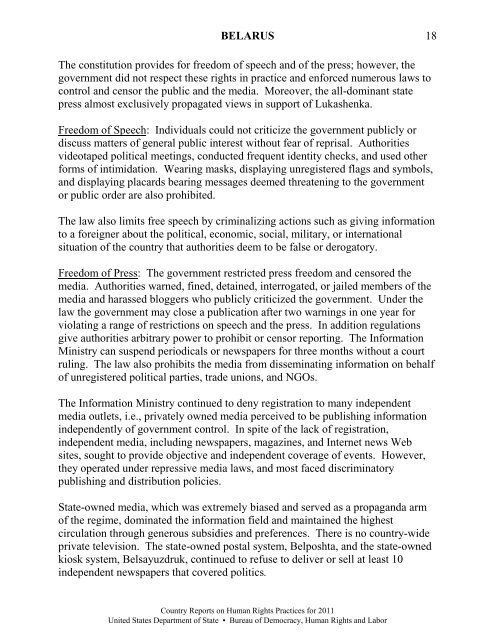belarus executive summary - US Department of State
belarus executive summary - US Department of State
belarus executive summary - US Department of State
You also want an ePaper? Increase the reach of your titles
YUMPU automatically turns print PDFs into web optimized ePapers that Google loves.
BELAR<strong>US</strong> 18<br />
The constitution provides for freedom <strong>of</strong> speech and <strong>of</strong> the press; however, the<br />
government did not respect these rights in practice and enforced numerous laws to<br />
control and censor the public and the media. Moreover, the all-dominant state<br />
press almost exclusively propagated views in support <strong>of</strong> Lukashenka.<br />
Freedom <strong>of</strong> Speech: Individuals could not criticize the government publicly or<br />
discuss matters <strong>of</strong> general public interest without fear <strong>of</strong> reprisal. Authorities<br />
videotaped political meetings, conducted frequent identity checks, and used other<br />
forms <strong>of</strong> intimidation. Wearing masks, displaying unregistered flags and symbols,<br />
and displaying placards bearing messages deemed threatening to the government<br />
or public order are also prohibited.<br />
The law also limits free speech by criminalizing actions such as giving information<br />
to a foreigner about the political, economic, social, military, or international<br />
situation <strong>of</strong> the country that authorities deem to be false or derogatory.<br />
Freedom <strong>of</strong> Press: The government restricted press freedom and censored the<br />
media. Authorities warned, fined, detained, interrogated, or jailed members <strong>of</strong> the<br />
media and harassed bloggers who publicly criticized the government. Under the<br />
law the government may close a publication after two warnings in one year for<br />
violating a range <strong>of</strong> restrictions on speech and the press. In addition regulations<br />
give authorities arbitrary power to prohibit or censor reporting. The Information<br />
Ministry can suspend periodicals or newspapers for three months without a court<br />
ruling. The law also prohibits the media from disseminating information on behalf<br />
<strong>of</strong> unregistered political parties, trade unions, and NGOs.<br />
The Information Ministry continued to deny registration to many independent<br />
media outlets, i.e., privately owned media perceived to be publishing information<br />
independently <strong>of</strong> government control. In spite <strong>of</strong> the lack <strong>of</strong> registration,<br />
independent media, including newspapers, magazines, and Internet news Web<br />
sites, sought to provide objective and independent coverage <strong>of</strong> events. However,<br />
they operated under repressive media laws, and most faced discriminatory<br />
publishing and distribution policies.<br />
<strong>State</strong>-owned media, which was extremely biased and served as a propaganda arm<br />
<strong>of</strong> the regime, dominated the information field and maintained the highest<br />
circulation through generous subsidies and preferences. There is no country-wide<br />
private television. The state-owned postal system, Belposhta, and the state-owned<br />
kiosk system, Belsayuzdruk, continued to refuse to deliver or sell at least 10<br />
independent newspapers that covered politics.<br />
Country Reports on Human Rights Practices for 2011<br />
United <strong>State</strong>s <strong>Department</strong> <strong>of</strong> <strong>State</strong> • Bureau <strong>of</strong> Democracy, Human Rights and Labor
















